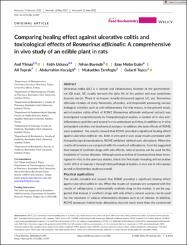| dc.contributor.author | Yılmaz, Anıl | |
| dc.contributor.author | Uçkaya, Fatih | |
| dc.contributor.author | Bayındır, Nihan | |
| dc.contributor.author | Güler, Eray Metin | |
| dc.contributor.author | Toprak, Ali | |
| dc.contributor.author | Koçyiğit, Abdurrahim | |
| dc.contributor.author | Eşrefoğlu, Mukaddes | |
| dc.contributor.author | Topçu, Gülaçtı | |
| dc.date.accessioned | 2022-09-12T10:40:00Z | |
| dc.date.available | 2022-09-12T10:40:00Z | |
| dc.date.issued | 2022 | en_US |
| dc.identifier.uri | https://hdl.handle.net/20.500.12868/1603 | |
| dc.description.abstract | Ulcerative colitis (UC) is a chronic and inflammatory disorder of the gastrointestinal (GI) tract. UC usually worsens the daily life of the patient and may sometimes become mortal. There is no known remedy discovered against UC, yet. Rosmarinus officinalis consists of many flavonoids, phenolics, and terpenoids possessing various biological activities such as anti-inflammatory. For this reason, in the present study, anti-ulcerative colitis effect of ROME (Rosmarinus officinalis methanol extract) was investigated comprehensively by histopathological studies, a number of in vivo anti-inflammatory activities and several in vivo antioxidant activities, in addition to in vitro antioxidant activities and biochemical analyses. In addition, the toxic effects of ROME were examined. The results showed that ROME provided a significant healing effect against ulcerative colitis in rats. Both in vitro and in vivo assay results correlated with histopathological examinations. ROME exhibited minimal toxic alterations. When the results of rosemary are compared with the results of sulfasalazine, it can be suggested that instead of synthetic drugs with side effects, natural sources can be used for the treatment of various diseases. Although some activities of rosemary have been investigated in vitro in the previous studies, this is the first study revealing anti-ulcerative colitis effect of rosemary through histopathological studies, in vivo and in vitro assays as well as biochemical analyses overall. Practical applications The results revealed and proved that ROME provided a significant healing effect against ulcerative colitis in rats. When the results of rosemary are compared with the results of sulfasalazine, a commercially available drug on the market, it can be suggested that instead of synthetic drugs with side effects, natural sources can be used for the treatment of various inflammatory diseases such as UC disease. In addition, ROME possesses limited toxic alterations, but not much more than the commercial drug. As a future perspective, lethal and therapeutic doses can be examined and determined. Thus, human studies can be started through this comprehensive in vivo study on rosemary which is commonly used as an edible plant and spice all over the world. | en_US |
| dc.language.iso | eng | en_US |
| dc.relation.isversionof | 10.1111/jfbc.14299 | en_US |
| dc.rights | info:eu-repo/semantics/closedAccess | en_US |
| dc.subject | Anti-inflammatory activity | en_US |
| dc.subject | Antioxidant activity | en_US |
| dc.subject | Antiulcer activity | en_US |
| dc.subject | Rosmarinus officinalis | en_US |
| dc.subject | Toxicological effects | en_US |
| dc.subject | Ulcerative colitis | en_US |
| dc.title | Comparing healing effect against ulcerative colitis and toxicological effects of Rosmarinus officinalis: A comprehensive in vivo study of an edible plant in rats | en_US |
| dc.type | article | en_US |
| dc.contributor.department | ALKÜ, Fakülteler, Sağlık Bilimleri Fakültesi, Hemşirelik Bölümü | en_US |
| dc.relation.journal | Journal of Food Biochemistry | en_US |
| dc.relation.publicationcategory | Makale - Uluslararası Hakemli Dergi - Kurum Öğretim Elemanı | en_US |


















